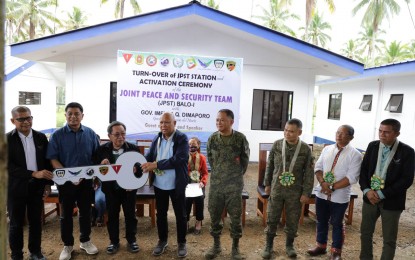
WORKING FOR PEACE. Representatives of the Philippine government, military and local officials lead the activation of the Joint Peace and Security Team (JPST) on Nov. 30, 2022. The Office of the Presidential Adviser on Peace, Reconciliation and Unity (OPAPRU) on Monday (Dec. 12, 2022) said JPST Balo-i facility is the third out of 11 stations to be constructed under a memorandum of agreement signed between the OPAPRU and AFP in support of the deployment of JPSTs in Mindanao. (Photo courtesy of OPAPRU)
MANILA – The Office of the Presidential Adviser on Peace, Reconciliation and Unity (OPAPRU) on Monday said the Government of the Philippines (GPH) Peace Implementing Panel and Armed Forces of the Philippines (AFP) have deployed Joint Peace and Security Team (JPST) and opened its station in Balo-i, Lanao del Norte last Nov. 30.
This is the second to the last JPST to be activated in the Bangsamoro Region for this year.
"The 30 JPST members – composed of contingents from the AFP, Philippine National Police (PNP), and the MILF (Moro Islamic Liberation Front) – Bangsamoro Islamic Armed Forces (MILF-BIAF) – will be housed in the newly-constructed facility built by the 55th Engineering Brigade of the 1ID(1st Infantry Division) under the command of Brig. Gen. Irineo Sebastian based in Pacalundo, Balo-i," it added.
The JPST Balo-i facility is the third out of 11 stations to be constructed under a memorandum of agreement signed between the OPAPRU and AFP in support of the deployment of JPSTs in Mindanao.
The creation of JPSTs is considered a major milestone under the Bangsamoro peace process, as former adversaries on the battlefield are now working side by side as partners in peace and development.
Col. Charlemagne Batayola, 2nd Mechanized Brigade deputy commander, said the creation of JPSTs is a solemn symbol and a beacon of hope among peace stakeholders, as they continue to move forward in their quest for long-lasting peace in the Bangsamoro.
“Collaboration allows us to know more than we are capable of knowing by ourselves. That's why a strong partnership and collaboration with the different regional provincial and local stakeholders is essential too in accomplishing our mission. But we cannot accomplish all that we need to do without working together,” he added.
“We, in the security sector, can assure you that we will always be here – to ensure a safer and peaceful Lanao del Norte conducive for economic development. Likewise, we are expecting that our local partners will also do their part through good governance. Because good governance is essential to have a peaceful, developed, insurgent and violent extremism-free community,” Batayola said.
The government launched in 2019 the recruitment and training of prospective members of the JPST who will be deployed in batches as peacekeeping forces in state-recognized MILF areas across Mindanao.
The JPSTs will be composed of 3,000 members coming from the MILF, 1,600 from the PNP, and 1,400 from the AFP.
“The success of these projects is [the] results of our genuine trust to pursue the realization of the normalization track of the Comprehensive Agreement on the Bangsamoro or the CAB,” 1st Infantry Division commander Brig. Gen. Antonio Nafarette said.
Nafarette also reaffirmed the AFP’s continuous support for the establishment of JPST stations, as they will ensure “the protection of the decommissioned combatants and all those combatants that [have] been decommissioned” in their respective communities.
Meanwhile, Bangsamoro Member of Parliament Abdullah Macapaar said the national government's peace and development initiatives will be successfully implemented if the people throw their full support behind them.
The 6,000-strong JPST will be playing a crucial peacebuilding role, as they are tasked to secure MILF communities that will be transformed into “peace and growth zones” under the normalization track of the CAB.
The decommissioning process is part of the CAB's normalization track, which aims to assist MILF combatants in transitioning to peaceful civilian life while transforming their communities into peaceful, progressive, and resilient communities.
For GPH peace implementing panel chairman Cesar Yano, the JPST is not just a 'mere decoration' but a mechanism that aims to foster greater understanding, peace and unity among the people.
He also reiterated the national government’s steadfast commitment to sustain the gains of peace, particularly by carrying out various socio-economic interventions in former conflict-affected areas in Mindanao.
Meanwhile, Ariel Felicidario, co-chair of the committee, clarified that it is not the role of JPSTs to carry out military offensives, but to help resolve "rido" (clan war) cases and to help sustain peace initiatives in the Bangsamoro.
To date, a total of 19 JPSTs have been activated and deployed in areas mutually identified by the GPH and MILF in Mindanao. Of the 24 JPSTs to be activated, five are still scheduled for deployment.
The JPST Balo-i in Lanao del Norte is the 19th JPST activated this year. (PNA)
